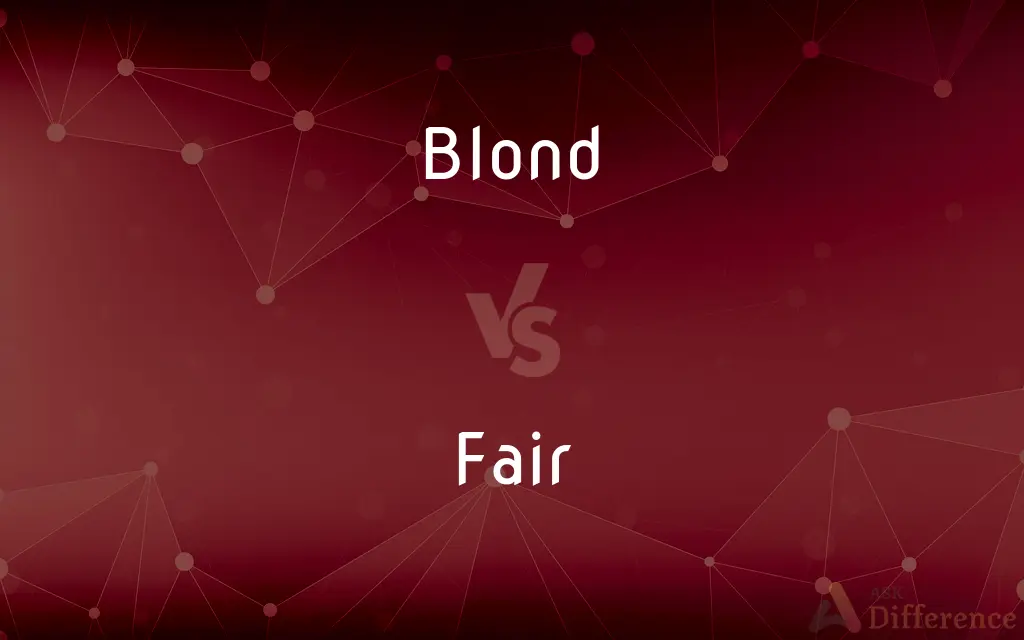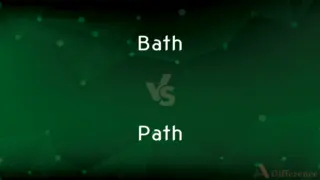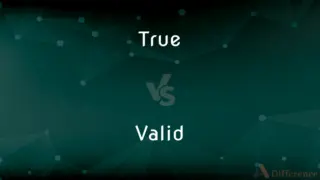Blond vs. Fair — What's the Difference?
By Fiza Rafique & Maham Liaqat — Updated on March 1, 2024
Blond refers to a light shade of hair color, often golden, while fair typically describes a light complexion or skin tone, not limited to hair.

Difference Between Blond and Fair
Table of Contents
ADVERTISEMENT
Key Differences
Blond is a specific descriptor for hair color, ranging from light yellow to deep gold and even lighter shades. It's a characteristic often associated with certain ethnic or geographic groups, notably those from Northern Europe. Fair, in contrast, is more commonly used to describe a light complexion or skin tone. It indicates a skin color that is light, often with a cool or warm undertone, but without much melanin.
The term blond specifically pinpoints the color of one's hair, setting apart individuals in terms of their physical traits. While "fair" can also refer to light hair, it is more inclusive, encompassing overall lightness in appearance, including skin and sometimes hair.
These terms intersect when discussing physical appearance, but they serve different descriptive purposes. Blond focuses exclusively on hair, highlighting one aspect of a person's looks, whereas fair can describe an entire range of features, primarily skin tone. This distinction is crucial in contexts where specificity about physical traits is necessary.
Both terms play significant roles in beauty, fashion, and personal identity, with cultural, historical, and social implications. For instance, perceptions of attractiveness and stereotypes may vary significantly based on whether someone is described as blond or fair, affecting how individuals are viewed and treated.
The choice between using blond or fair depends on the aspect of appearance one wishes to emphasize. If the discussion is about hair color, "blond" is precise. When referring to skin tone or a more general lightness in appearance, "fair" is more appropriate. Understanding the nuances between these terms helps in their accurate and context-sensitive application.
ADVERTISEMENT
Comparison Chart
Definition
A light shade of hair color.
A light complexion or skin tone.
Primary Usage
Describing hair color.
Describing skin tone.
Associated With
Hair.
Skin, and sometimes hair.
Variations
From light yellow to deep gold.
Includes overall lightness in appearance.
Contexts
Beauty, fashion, identity.
Beauty, cultural perceptions, identity.
Compare with Definitions
Blond
Describes light-colored hair typically associated with Northern Europe.
His blond hair stood out in the crowd.
Fair
Can imply beauty or attractiveness through lightness.
Fairy tales often describe princesses with fair skin.
Blond
Refers to very light shades of hair.
The child's hair was almost platinum blond.
Fair
Used to describe a just and unbiased attitude, unrelated to physical appearance.
The judge was known for being fair.
Blond
A hair color of light yellow to golden shades.
She decided to dye her hair blond for the summer.
Fair
Refers to an equitable or just outcome.
They sought a fair solution to the dispute.
Blond
Can denote hair lighter than brown.
She highlighted her hair to a lighter blond.
Fair
Fairness, beauty.
Blond
Sometimes used to stereotype or categorize people.
The classic image of a surfer with sun-bleached blond hair is well-known.
Fair
Describes a light complexion or skin tone.
Her fair skin was particularly sensitive to the sun.
Blond
Blond or fair hair, also blonde, is a hair color characterized by low levels of the dark pigment eumelanin. The resultant visible hue depends on various factors, but always has some yellowish color.
Fair
In the context of weather, means clear and sunny.
The forecast promised fair weather for the weekend.
Blond
Having fair hair and skin
Blond Scandinavians.
Fair
A fair (archaic: faire or fayre) is a gathering of people for a variety of entertainment or commercial activities. It is normally of the essence of a fair that it is temporary with scheduled times lasting from an afternoon to several weeks.
Blond
Of a flaxen or golden color or of any light shade of auburn or pale yellowish brown
Blond hair.
Fair
Treating people equally without favouritism or discrimination
The group has achieved fair and equal representation for all its members
A fairer distribution of wealth
Blond
Of a bleached or pale golden (light yellowish) colour.
Blond hair
Blond ale
Blond beer
Fair
Of light complexion
Fair skin.
Blond
A person with this hair color.
Fair
To make fair or beautiful.
Blond
A person with fair skin and hair
Fair
Free from spots, specks, dirt, or imperfection; unblemished; clean; pure.
A fair white linen cloth.
Blond
Being or having light colored skin and hair and usually blue or gray eyes;
Blond Scandinavians
A house full of light-haired children
Common Curiosities
What is the main difference between blond and fair?
Blond specifically describes a light hair color, while fair refers to a light skin tone.
Can someone be blond and not fair?
Yes, individuals can have blond hair while having a darker or more tanned skin tone.
How do beauty standards influence the use of these terms?
Beauty standards can affect the desirability and perceived attractiveness of being blond or fair, influencing fashion and personal choices.
Can "fair" be considered subjective?
Yes, what is considered fair skin can vary significantly between cultures and individuals.
Is fair skin the same as being pale?
Fair skin is light in tone but not necessarily pale; pale often implies a lack of color or health.
Can the term "fair" apply to hair color?
While less common, "fair" can sometimes be used to describe very light hair, but it primarily refers to skin tone.
Why is blond hair often highlighted in descriptions?
Blond hair is distinctive and culturally significant in many societies, making it a notable feature in descriptions.
Is it more common to use "blond" for women and "blonde" for men?
The spelling "blond" is gender-neutral in American English, but some other languages and contexts use "blonde" for women and "blond" for men.
Do perceptions of blond and fair vary culturally?
Yes, cultural perceptions of beauty and attractiveness can significantly influence how blond hair and fair skin are viewed.
Are there any fashion or styling tips specific to blond or fair individuals?
Yes, fashion and beauty advice often tailors to complementing blond hair or fair skin, emphasizing colors or styles that enhance these features.
How do "blond" and "fair" relate to identity and self-perception?
These terms can significantly influence one's identity and self-perception, affecting how individuals see themselves and are seen by others.
Can both terms be used interchangeably in any context?
No, due to their specific references to hair and skin, they are not interchangeable, except in very broad or metaphorical contexts.
How do authors use these terms in literature?
Authors may use these terms to describe characters, setting visual imagery, or invoking certain stereotypes or cultural associations.
Are there any health implications associated with being blond or fair?
Fair skin may be more sensitive to sun exposure, increasing the risk of sunburn and skin cancer, while blond hair does not have direct health implications.
How do historical contexts influence the perception of blond and fair?
Historical and cultural narratives often glorified blond hair and fair skin, affecting societal perceptions and preferences.
Share Your Discovery

Previous Comparison
Bath vs. Path
Next Comparison
True vs. ValidAuthor Spotlight
Written by
Fiza RafiqueFiza Rafique is a skilled content writer at AskDifference.com, where she meticulously refines and enhances written pieces. Drawing from her vast editorial expertise, Fiza ensures clarity, accuracy, and precision in every article. Passionate about language, she continually seeks to elevate the quality of content for readers worldwide.
Co-written by
Maham Liaqat













































